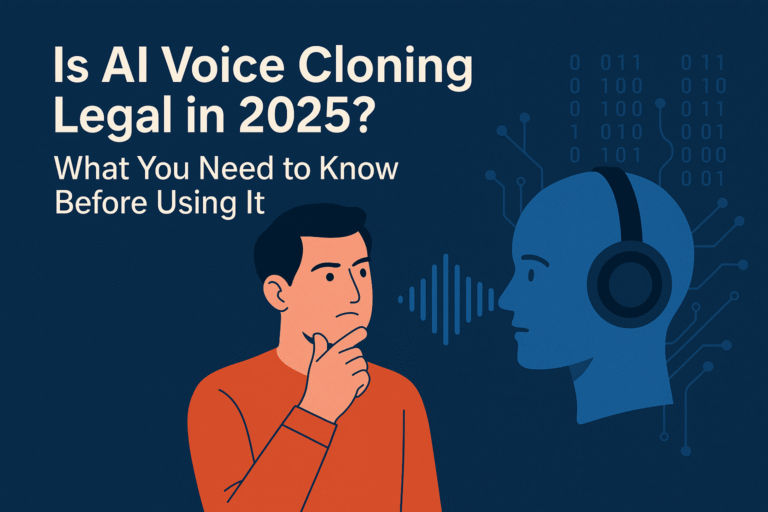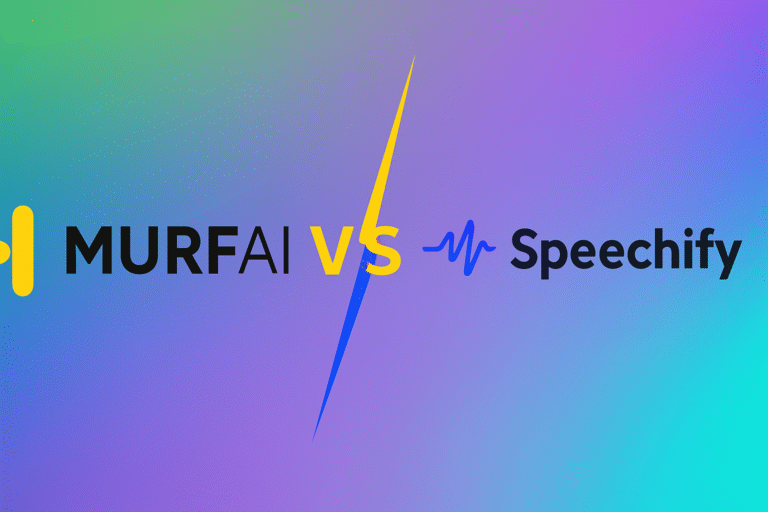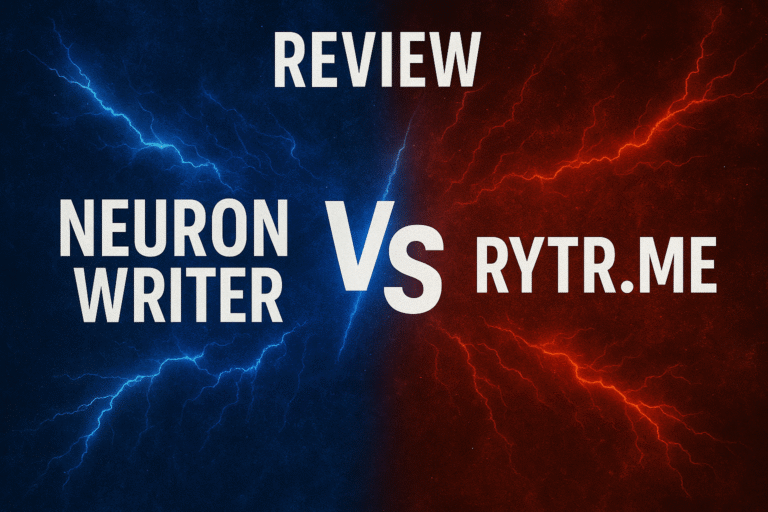In an age where artificial intelligence can generate essays, emails, and even novels with a few simple prompts, one question looms large: What does this mean for the human mind behind the keyboard? AI writing tools like ChatGPT, Frase, and Writesonic have revolutionized how we approach the blank page—offering speed, structure, and sometimes even style at the click of a button. But while the convenience is undeniable, it raises deeper concerns tied to the psychology of AI writing, questions about creativity, cognitive effort, and the evolving sense of authorship in a digital world.
Are we gaining new mental space for bigger ideas, or losing something essential by letting algorithms write for us? Is AI a co-writer, a crutch, or a quiet thief of our original voice?
Find our list of best AI Writing Tools
The Rise of AI Writing Tools
To understand the psychological impact of AI on writing, we must first trace how far these tools have come. The journey began with basic autocorrect and predictive text, offering modest typing assistance. Over time, technology advanced through machine learning and natural language processing, eventually giving rise to fully generative AI models capable of producing coherent, human-like content.
The launch of OpenAI’s GPT models marked a major turning point, transforming AI from a passive assistant to an active writing collaborator. Today, platforms like ChatGPT, Frase, Writesonic, Jasper, and Copy.ai empower millions of users—marketers, students, bloggers, and business professionals alike—to create content faster and more efficiently than ever before.
Why the Psychology of AI Writing Drives Widespread Use
Convenience, speed, and creative support are the driving forces behind the adoption of AI in writing. Whether overcoming writer’s block, generating SEO-optimized blogs, or simply meeting tight deadlines, AI offers a reliable shortcut. Many now rely on these tools not only to polish their prose but also to brainstorm, outline, and even draft full pieces of content.
From academic essays to ad copy, the variety of use cases is growing daily. As these tools become more accessible and powerful, they prompt a deeper question: At what point does helpful assistance begin to interfere with our cognitive engagement and creative ownership?
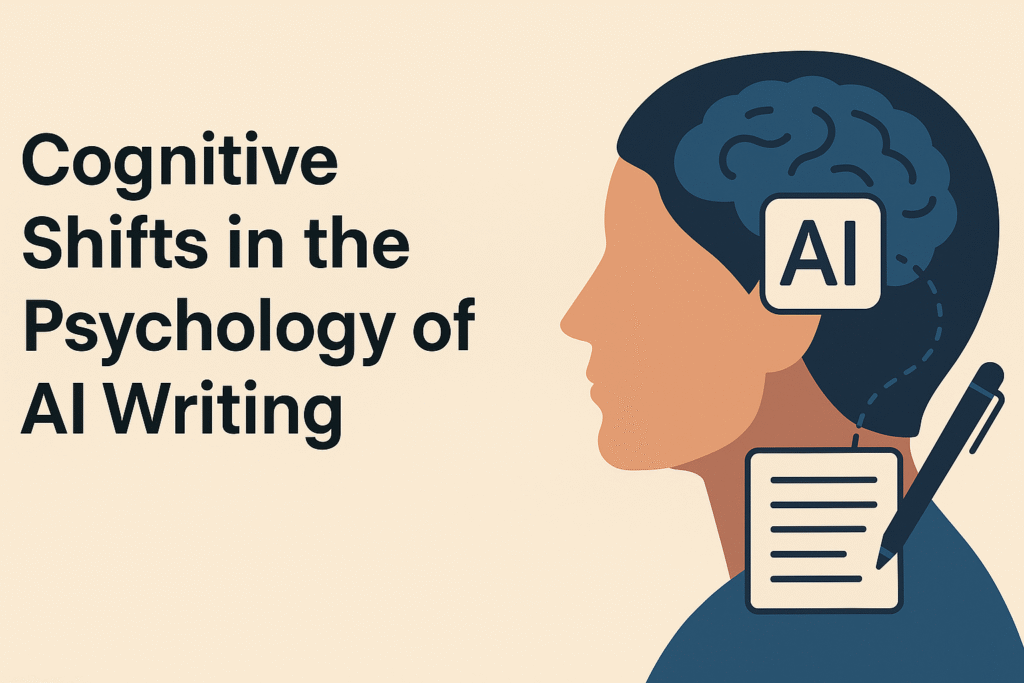
Cognitive Shifts in the Psychology of AI Writing
While AI writing tools offer undeniable convenience, they also introduce a subtle but important shift in how we engage with the writing process. What once demanded sustained focus, brainstorming, and revision can now be executed in seconds with the right prompt. But with that ease comes a trade-off: we begin to outsource not just writing—but thinking.
Cognitive Offloading in the Psychology of AI Writing
Cognitive offloading is a psychological term for relying on external tools to manage mental tasks. Just as we use calculators for math or calendars to remember appointments, AI is now doing the heavy lifting in writing. While this reduces mental fatigue and speeds up tasks, it may also weaken our natural ability to think critically, structure arguments, or develop unique ideas from scratch.
When AI fills in the gaps, we’re less likely to struggle—and struggle is often where creativity and learning are born. Instead of experiencing the slow, reflective process of refining our thoughts into words, we risk accepting surface-level solutions generated by algorithms trained on generic patterns.
Impact on Attention and Flow
Moreover, this reliance can affect our attention span and ability to enter a “flow state”—a deep, focused mental zone critical for original thought. Constantly jumping between prompting AI and editing output may fragment our concentration, making it harder to develop meaningful or complex content independently.
Understanding the Psychology of AI Writing and Its Creative Impact
One of the most debated effects of AI writing tools is their impact on creativity. On the surface, AI can seem like the ultimate creative partner—ready to generate ideas, rewrite sentences, and even mimic different tones. But beneath this helpful exterior lies a pressing question: Are AI tools enhancing our creative output, or subtly replacing it?
AI as a Creative Catalyst—or Constraint
On one hand, AI can act as a creative springboard. Writers facing blank-page paralysis often find that a quick prompt can unlock inspiration and momentum. Tools like ChatGPT or Writesonic can suggest hooks, reframe paragraphs, and even play the role of a brainstorming partner. In this sense, AI can empower users to build on raw ideas, refine them, and reach a finished product more quickly.
On the other hand, there’s a risk that repeated exposure to AI-generated patterns may dull our originality. AI is trained on massive datasets of existing content, which means its suggestions tend to lean toward the average, the expected, the familiar. Over time, relying on this kind of output could lead writers to unconsciously mimic generic phrasing, adopt formulaic structures, or abandon more experimental styles.
Striking the Balance
True creativity often emerges from friction, mistakes, and exploration. When we skip that process in favor of instant AI results, we risk flattening our creative voice. The challenge, then, is not just using AI—but using it without letting it use us.
How the Psychology of AI Writing Challenges Traditional Authorship
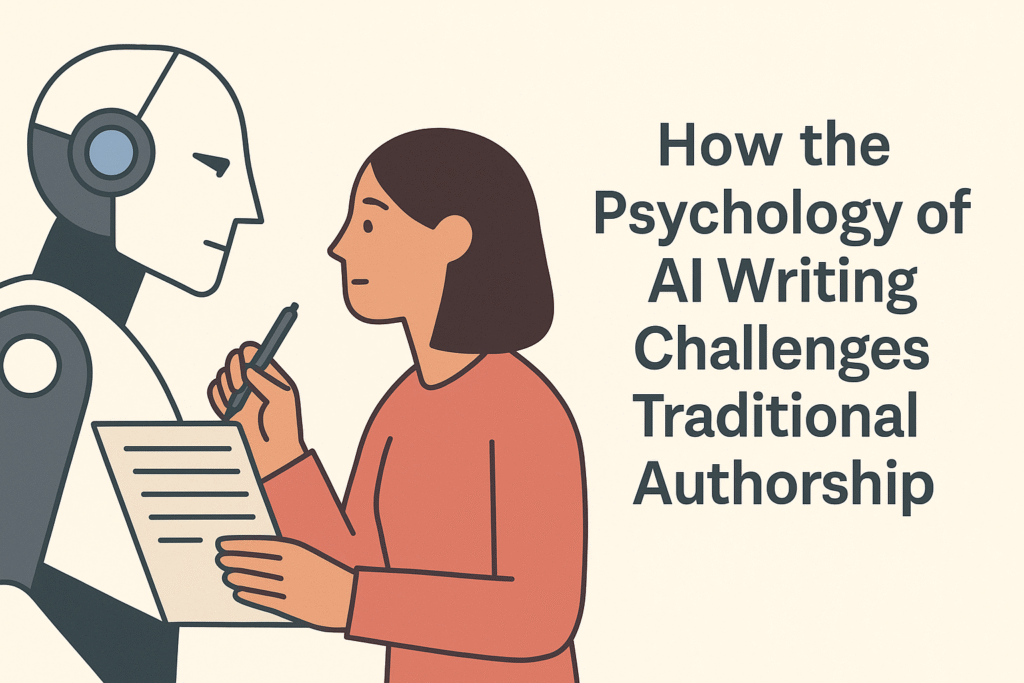
As AI tools increasingly assist in content creation, a more complex issue begins to surface: authorship. Who truly owns a piece of writing when an algorithm has helped shape it? And more importantly, how does this influence a writer’s sense of identity, ownership, and pride in their work?
Who’s the Real Author?
Traditionally, authorship implies originality, intention, and accountability. But when a blog post, article, or even poem is drafted with heavy AI involvement, those lines blur. The words may reflect your ideas—but were they really your words? This raises both ethical and psychological questions. In academic or professional settings, where originality is often paramount, using AI can feel like cutting corners—or worse, like plagiarism.
More subtly, when writers begin to depend on AI for tone, structure, or even word choice, they may start to lose connection with their unique voice. Over time, this can lead to a diluted creative identity, where individuals feel more like editors of machine-generated content than creators.
Emotional Distance from the Work
There’s also an emotional dimension. Writing is often a deeply personal act—a way to express, process, and share one’s inner thoughts. But when AI takes over much of that labor, the emotional reward of authorship can diminish. Does hitting “generate” offer the same satisfaction as crafting something from scratch? For many, the answer is no.
Psychological Benefits of AI Writing Tools
While much of the conversation around AI in writing focuses on risks and drawbacks, it’s equally important to recognize the psychological upsides. For many users, AI writing tools serve as more than just convenience—they offer emotional and motivational support.
Reducing Anxiety and Perfectionism
For writers who struggle with perfectionism, procrastination, or blank-page anxiety, AI can be a valuable ally. By generating an initial draft or suggesting a structure, these tools help break the paralysis that often accompanies high-pressure writing. The simple act of having something—anything—on the page can reduce stress and create momentum.
This is especially true for non-native speakers, students, or professionals who feel intimidated by traditional writing standards. AI helps them express ideas more confidently and polish their language, offering a sense of progress rather than pressure.
Encouraging Practice and Experimentation
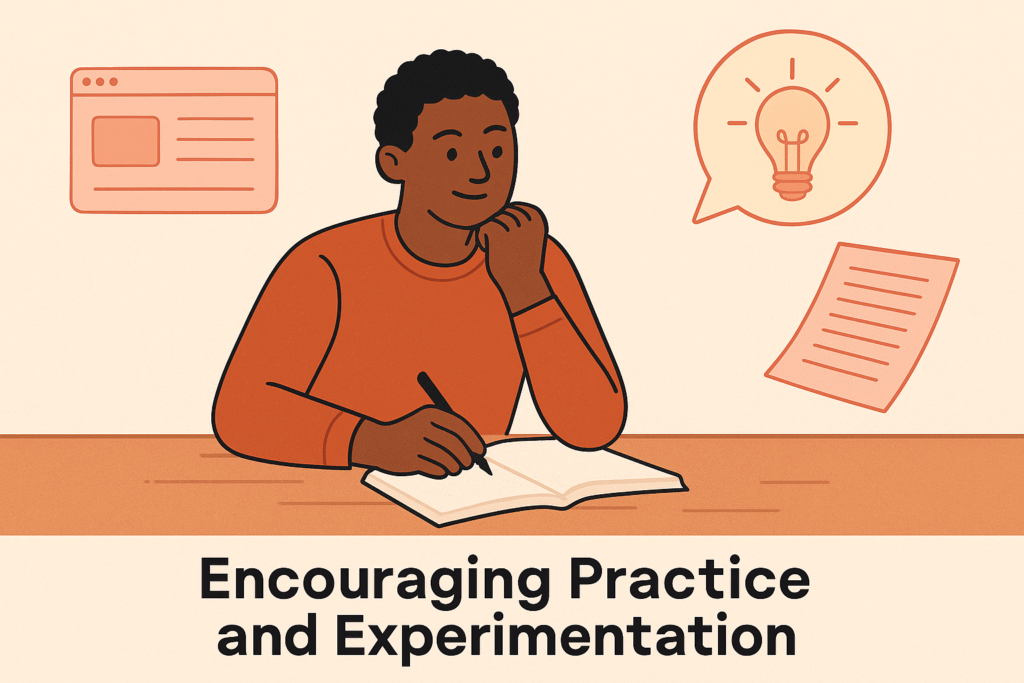
AI tools also foster creative experimentation. Writers can test different styles, tones, or formats without fear of failure. The instant feedback loop encourages iteration, which can build writing confidence over time. In this way, AI becomes a kind of writing coach—not replacing the writer’s mind, but helping it stretch.
Long-Term Psychological Impacts
As AI writing tools become more integrated into everyday workflows, their long-term effects on the human mind and sense of self are worth serious attention. Beyond convenience, these tools may be reshaping how we express, think, and even perceive our creative identities.
Dependence Over Development
One concern is growing dependence. Just as overuse of GPS has been shown to reduce our ability to navigate independently, relying too heavily on AI for writing could impair our ability to develop original arguments, refine ideas, or engage in deep analysis. If we skip the struggle and let AI do the heavy lifting, we may sacrifice the cognitive growth that comes from wrestling with words.
Shifts in Identity and Self-Expression
Writing has always been a powerful tool for self-reflection and identity formation. But when algorithms begin to shape that expression, it raises the question: Are we still writing, or are we simply curating what AI creates? Over time, this shift could alter how individuals view their own intellect, creativity, and voice.
Recent research in cognitive science suggests that over-reliance on assistive technologies can subtly reduce confidence in one’s own abilities. If AI becomes a default for expressing thoughts, we risk outsourcing not just our labor—but our self-expression.
Balancing AI and Human Creativity
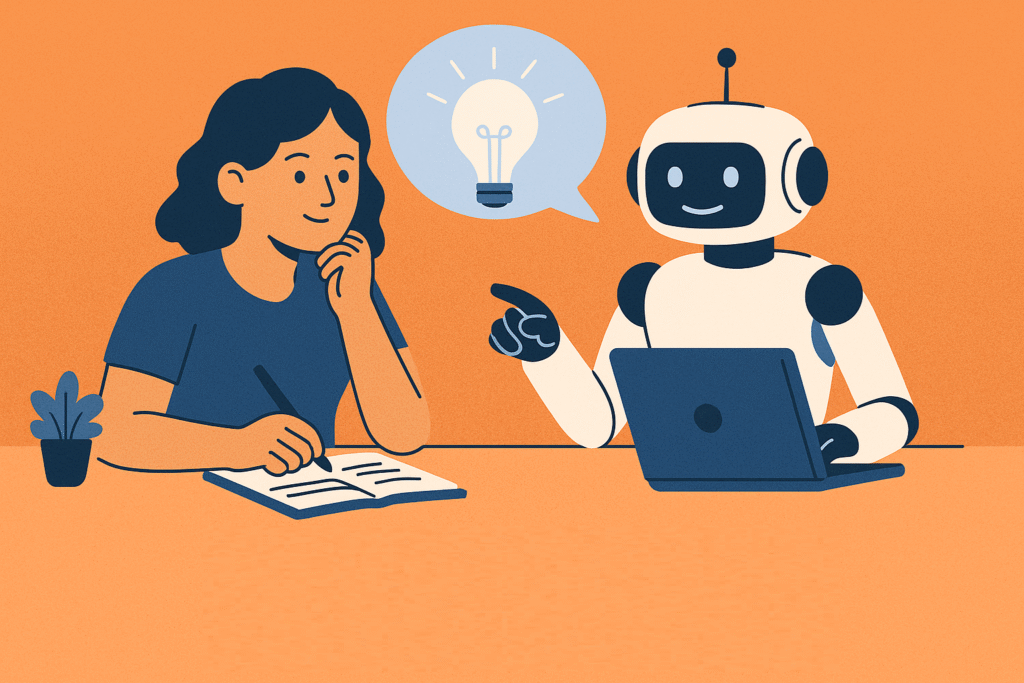
While the challenges are real, the goal isn’t to reject AI—it’s to use it consciously and creatively. Finding the right balance can help writers harness AI’s power without losing their voice.
Use AI to Enhance, Not Replace
Start by letting your own ideas lead. Think before you prompt. Use AI to refine, expand, or reframe—not to originate your entire message. This keeps your writing grounded in personal intent and originality.
Treat AI as a collaborator, not a crutch. Allow it to offer suggestions, but don’t accept outputs uncritically. The best results come when human intuition meets machine efficiency.
Revise to Reclaim Your Voice
Always personalize what the AI generates. Add your tone, adjust the structure, insert your perspective. These small acts of editing can make a big difference in ensuring the content feels authentically yours.
In the end, AI is a powerful tool—but it’s your mind, experience, and creativity that give content its soul.
Conclusion
As AI writing tools continue to evolve, they offer a powerful mix of opportunity and challenge. On one hand, they provide speed, support, and even creative stimulation. On the other, they pose real questions about originality, mental engagement, and the future of authorship.
Ultimately, the psychology of AI writing tools isn’t just about how they function—but about how we use them. Are we writing smarter, or thinking less? Are we enhancing our voices, or letting them be reshaped by machines?
The key lies in mindful use. When wielded with intention, AI can be a valuable partner in the creative process—not a replacement for it. So the next time you prompt a tool to write for you, ask yourself:
Is this helping me express myself, or is it doing the thinking for me?

